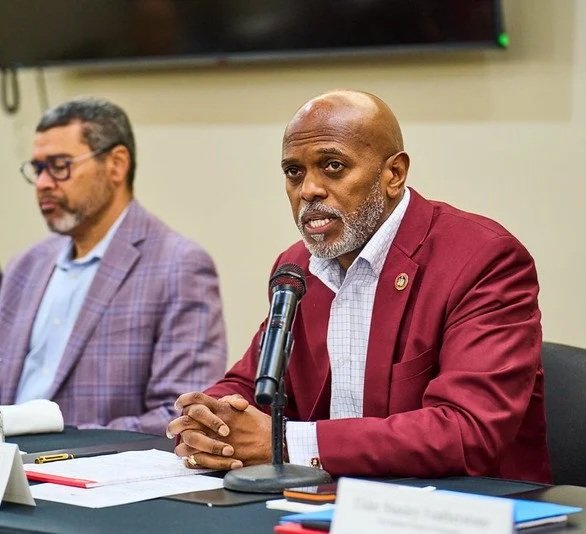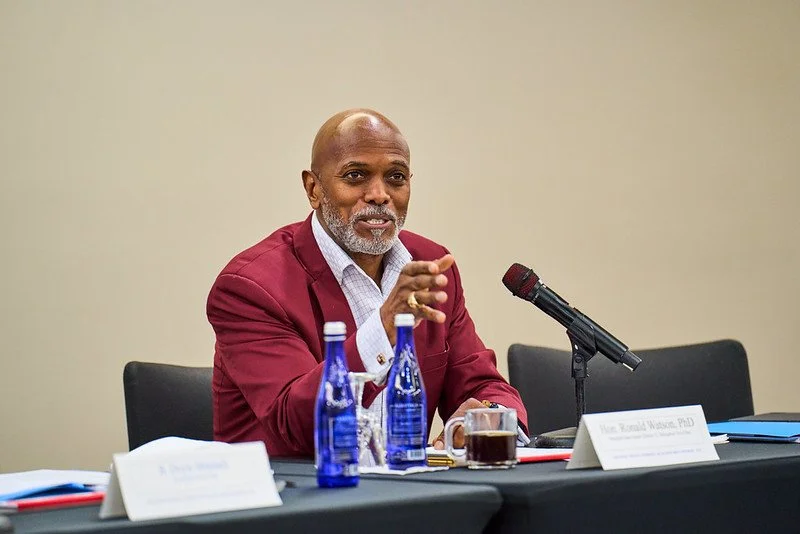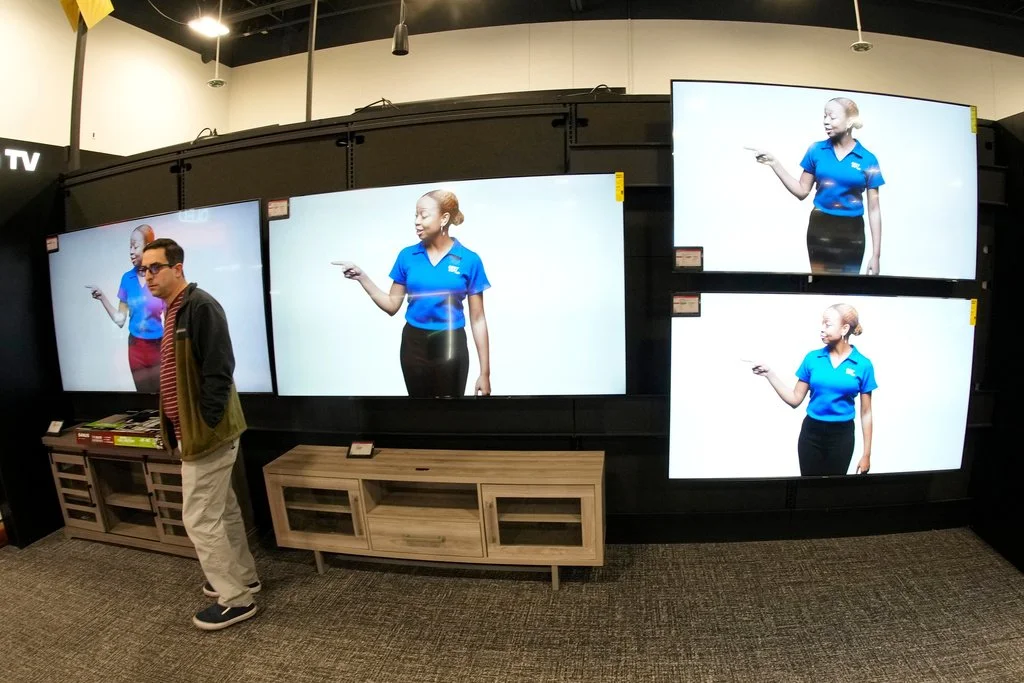Sen. Watson Speaks About Hard Choices For County Future
Forging the Future: Senator Ron Watson’s Vision for a Stronger Prince George’s County
By Raoul Dennis
Maryland Senator Ron Watson (D-23)—engineer, technologist, and now chair of the Prince George’s County Senate Delegation—has never been shy about challenging conventional thinking. Whether discussing the state’s ballooning deficit, the untapped power of data centers, or the urgent need to protect Maryland homeowners from sophisticated fraud, Watson is pushing his colleagues and his county to look squarely at the future. And not just to look at it—but to run toward it.
Watson brought these character traits to his presentation at a November 12 meeting of the Greater Prince George’s Business Roundtable. For over two decades, The Roundtable has been known as ‘a non-profit, nonpartisan business alliance of Chief Executives, formed to improve our political, economic, and community environments for a better Prince George’s County.’
A Deficit Emerges—and the Stakes Rise
Watson’s message begins with sober clarity: Maryland’s fiscal picture is changing rapidly. “We went from a $300 million surplus last year to… about a $1.6 billion deficit,” he told business leaders recently, noting that layoffs, federal uncertainty, tariffs, and inflation all contributed to the swing . The state is constitutionally required to balance its budget, he emphasized—meaning that 2026 will demand tough decisions.
The deficit is also compounded by job losses, particularly among displaced federal workers seeking back pay or awaiting reinstatement. “We have… many people who have been unemployed, displaced, waiting for a paycheck,” Watson said, reflecting on the growing human impact of stalled political negotiations and government shutdown threats .
Maryland Governor Wes Moore has taken emergency steps—including placing millions toward SNAP and food-security supports—but Watson warns that structural change is needed. “We need a real long-term plan and long-term strategy,” he said pointedly. “Once we balance it, folks move off and figure out what’s next.”
Data Centers: The “New Hotness” With Billion-Dollar Potential
Part of Watson’s long-term vision includes embracing economic engines that Maryland has hesitated to fully activate—starting with data centers.
For Watson, this is not hypothetical. It is a missed opportunity hiding in plain sight. He recalls meeting a Virginia legislator representing Loudoun County, widely considered the data-center capital of the world and is known as Data Center Alley. The state has 650 data centers,” He says, ‘I got 47 data centers. We have a $5 billion surplus. We are killing it. What you guys doing?’” Watson recounted. “Data centers have the ability to generate much more tax revenue… than iGaming.”
Watson sees them as a cleaner, community-friendly alternative to gambling initiatives, without the social costs of addiction or cannibalized casino revenue. One data center in every Maryland county, he argues, would create an unprecedented stream of recurring income.
But Prince George’s County has hesitated. And Watson’s response is direct: residents must understand the tradeoffs of saying no to revenue. “Money has to come from somewhere,” he warns. “You can’t just say no and expect to get amenities… or your roads to be improved.”
For a county long described as a “bedroom community,” Watson argues that economic transformation requires more than hope—it requires a willingness to say yes.
Quantum Computing, Cybersecurity, and the Science Economy
Watson, an engineer by training, sees Maryland sitting at the threshold of a broader technological revolution. He points to the jobs that would have accompanied the FBI headquarters in Greenbelt and the Bureau of Engraving facility planned for Beltsville—both stalled by federal interference.
“You put an FBI building [here], the infrastructure around it… would spur so much economic growth,” he said. “Science and tech would take off right here in Prince George's County. It would be unbelievable.”
Maryland is already home to federal labs, cybersecurity firms, quantum research hubs, and Bowie State University—where Watson recently secured $200,000 for advanced AI weapons detection technology. In his view, the county is uniquely positioned to capture emerging industries. But only if it modernizes its commercial landscape, zoning rules, and approach to development.
Protecting Homeowners: Ending “Home Stealing” in Maryland
Among the delegate’s most urgent priorities is a legislative response to a new wave of sophisticated home thefts—or “home stealing”—that exploits outdated legal processes and technological gaps.
“These folks are real sophisticated,” Watson said, describing criminal groups who forge deeds, create fake leases, and take over properties while owners are away. Police currently cannot verify property ownership on the spot, forcing disputes into lengthy court proceedings.
“What I wanted to do,” Watson said, “is bring technology to bear… like blockchain.”
He is sponsoring legislation to create a statewide blockchain property ledger, allowing officers to instantly confirm deed holders—effectively eliminating fraudulent claims. He also plans to make fraudulent entry, document forgery, and illegal lock changes a felony.
This is not simply a crime bill. For this lawmaker, it’s about ensuring homeownership remains secure—a foundation for generational wealth in a county where many residents are first-time homeowners.
Reimagining Land—From Six Flags to Bowie Racetrack
Prince George’s County holds rare expanses of developable land inside a major metro region. But Watson is blunt: the county is not maximizing them.
Six Flags and the Commanders stadium site, he notes, “only generated $9 million of tax revenue… an extraordinary waste of land and resources” .
He envisions something bold, such as an indoor ski and entertainment complex modeled on Fairfax Peak, combined with restaurants, theaters, and even data centers—“500 acres… entertainment… restaurants… a data center… anything else you want,” he said. “It has that much value” .
Similarly, the Bowie Racetrack—soon to be conveyed to the city—faces costly environmental remediation due to arsenic-contaminated soil. Still, Watson urges policymakers to think big: solar fields, mixed-use potential, and revenue-generating amenities all remain on the table.
Transportation, Tesla, and the Future of Mobility
Watson is also working to modernize Maryland’s transportation and automotive industry—starting with consumer access. Maryland law currently limits Tesla to four dealerships statewide, all outside Prince George’s County.
“I can’t… look at all the Teslas driving around knowing we have to go to Bethesda and Gaithersburg to get our cars repaired,” he said. “We have a responsibility to fix that.”
His bill would add a fifth dealership—located in Prince George’s.
He is also preparing for the surge in electric vehicles and the long-term decline of gas-tax revenue. The General Assembly, he noted, must explore new models such as tire taxes, weight-based vehicle fees, and other creative mechanisms to fund road improvements.
Zoned Entertainment Districts and a Modern Tax Base
For Watson, zoning reform isn’t bureaucracy—it’s economic destiny. Entertainment zones, flexible development districts, and business-attracting policies are essential tools for strengthening the commercial tax base and reducing dependence on residential property taxes.
He argues passionately that elected leaders must listen to the “silent majority,” the residents who want amenities, jobs, and thriving retail—not just the handful who show up to oppose change.
“We have to make decisions that are going to propel Prince George’s County where we need to be,” he said. “We have too many resources to let it go by the wayside” .
A Vision Rooted in Growth, Technology, and Bold Choices
Ultimately, Senator Watson’s vision for Prince George’s County is both pragmatic and ambitious: a diversified economy powered by technology, protected homes and stronger laws, modern infrastructure, and vibrant commercial centers designed for a 21st-century workforce.
It is a future he believes is not only possible—but necessary.
“My job is to bring you kicking and screaming into the future if that’s what I have to do. That’s what I got elected for,” he said with characteristic humor and resolve.
And for Prince George’s County, a future worth fighting for.








